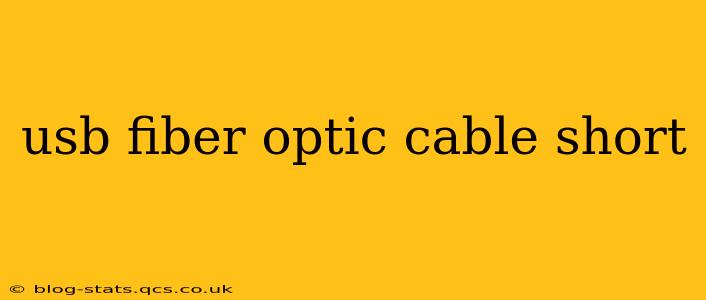Finding a short USB fiber optic cable can be trickier than you might think. While longer lengths are readily available for high-bandwidth data transmission over longer distances, shorter cables are less common. This guide will explore the reasons behind this, the options available, and the key factors to consider when choosing a short USB fiber optic cable.
Why are Short USB Fiber Optic Cables Less Common?
The primary reason short USB fiber optic cables aren't as prevalent as their longer counterparts is simply economics. Fiber optic technology excels at long-distance transmission, mitigating signal degradation. For short distances, the cost of the fiber optic cable, connectors, and the specialized equipment needed for termination often outweigh the benefits compared to standard copper USB cables. Copper cables are cheaper and perfectly adequate for short-range applications.
What are the Options for Short USB Fiber Optic Cables?
While dedicated "short" USB fiber optic cables might be hard to find readily on the shelf, you do have options:
-
Custom-made cables: This is often the most reliable approach if you need a very specific short length. Many cable manufacturers can create custom cables to your exact specifications. Expect this to be more expensive than off-the-shelf solutions.
-
Adapting longer cables: You could purchase a longer USB fiber optic cable and simply shorten it yourself. However, this is strongly discouraged unless you have extensive experience with fiber optic cable termination. Improper termination can easily damage the fiber and render the cable unusable, potentially even damaging connected equipment. Professional termination is crucial for reliable operation.
-
Using a fiber optic transceiver with short copper connections: This is a viable option. Instead of a direct fiber optic connection, you use fiber optic transceivers at each end of the connection. These transceivers convert the USB signal to optical and back again. You'd then use short copper cables to connect to the transceivers. This approach is often more cost-effective for short distances, but introduces additional equipment and potential points of failure.
What are the Benefits of Using Fiber Optic Cables (Even Short Ones)?
Even for short distances, fiber optic cables offer several advantages:
-
Enhanced security: Fiber optic cables are extremely difficult to tap into without detection, making them ideal for applications where data security is paramount.
-
High bandwidth: Although less critical over short distances, fiber optics still offer significantly higher bandwidth compared to copper cables, which can be beneficial for high-speed data transfers like 4K video or large file transfers.
-
Electromagnetic interference (EMI) immunity: Fiber optic cables are immune to electromagnetic interference, ensuring reliable data transmission even in noisy environments.
What Factors Should I Consider When Choosing a USB Fiber Optic Cable?
-
Length: While the focus is on short lengths, precisely determine the required length to avoid unnecessary cable slack.
-
Connector type: Ensure the connectors (e.g., USB-A to USB-C, etc.) are compatible with your devices.
-
Fiber type: Different fiber types (single-mode vs. multi-mode) offer varying performance characteristics. For short distances, multi-mode fiber is generally sufficient and more cost-effective.
-
Bandwidth: Choose a cable with sufficient bandwidth to support your data transfer needs.
-
Cost: Balance the benefits of fiber optics against the higher cost compared to copper cables.
Are there any specific applications where a short USB fiber optic cable is advantageous?
While less common, short USB fiber optic cables might be beneficial in specialized applications requiring high security and data integrity within a confined space, such as secure data transfer within a server rack or a high-bandwidth connection in a sensitive environment.
How much does a short USB fiber optic cable cost?
The cost significantly depends on whether you get a custom-made cable or utilize transceivers with short copper connections. Custom cables can be quite expensive. Using transceivers will likely be more cost-effective for short lengths, but adds the equipment cost. There isn't a fixed price for a "short" USB fiber optic cable due to the variability.
This guide provides a comprehensive overview of short USB fiber optic cables, addressing common questions and offering informed advice. Remember that professional installation or termination is crucial if you’re modifying existing cables. For most short-distance applications, standard copper USB cables will suffice; however, for specialized needs, fiber optics offer unique benefits.
